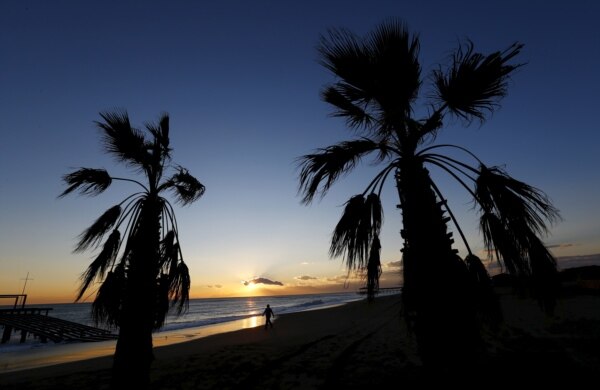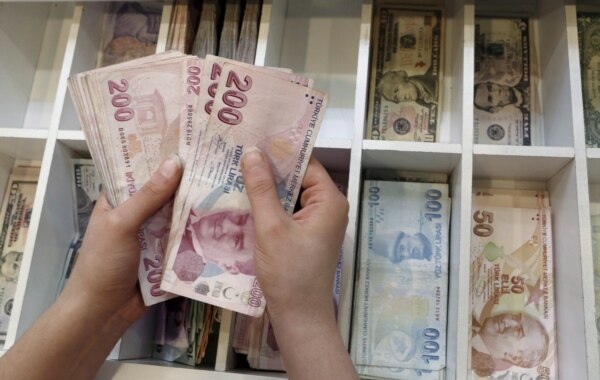Terrorism and Russian sanctions have left Turkey’s already struggling economy bracing for the worst.
Tourism seems sure to take hit, analysts say, after a suicide bomber aligned with Islamic State (IS) blew himself up in a crowd of German tourists this week, killing 10. German tourists make up roughly 15 percent of Turkey’s tourism industry, which earns the country $34 billion annually.
“Who will want to come to Turkey now?” asked Refet Kayakiran, a Turkish tourism expert.
“After the bombing, Turkey tourism is finished," he added, noting the rash of German tourism cancellations.
The bombing came as the Turkish economy starts to see the effects of Russian sanctions, which Moscow imposed following a diplomatic row with Ankara over Turkey’s downing of a Russian fighter jet in along the Turkish-Syrian border last November.
Turkey said the jet, operating in support of government forces against rebels in Syria's civil war, entered its air space — a charge Russia denied.
Russia's sanctions are largely aimed at Turkey’s tourist, agricultural and banking sectors.
"Turkey will lose $3.1 billion worth of trade in 2016 due to Russian economic sanctions," Turkish Deputy Prime Minister Mehmet Simsek said last week at a meeting in Washington.

FILE - A woman walks on the beach at sunset in the Mediterranean resort town of Belek in Antalya, Turkey, Jan. 8, 2016.
Kayakiran said the combination of Russian sanctions and terrorism fears will have a ripple effect, hurting not only hotels and resorts, but also shop owners, cab drivers and street vendors, whose livelihoods depend on visitors.
“Making up for these losses may take many years,” he said. “How can you calculate that in numbers?”
Russia has banned the import of Turkish fruits and vegetables, poultry and even salt.
“Russia has 60 percent of our fruit and vegetable exports,” said Burhan Er, the president of the Turkish Fruit and Vegetable Sellers Association. “We lost all of that. Russia is a big market for us.”
Russian Tourists
Moscow also banned the sale of charter vacations to Turkey for Russian citizens.
In Istanbul’s touristy Laleli area, where shops sell mostly leather products, clothes, carpets, and souvenirs, the impact is already seen.
“Business with Russia was already slowing down,” said Laleli businessman Zafer Soylu. “The downing of the Russian jet added to that. Many shops around here will have to close.”
Losing Russian tourists could cost Turkey more than $3 billion a year, according to industry experts. In 2014 alone, 4.5 million Russian tourists visited Turkey.
Food Exports, Energy
The Russian ban on imported Turkish food products will mean financial losses of about $764 million, the Turkish Agriculture Ministry said last week.
Moscow has also suspended a new pipeline project called "Turkish Stream" that was to deliver natural gas exports to Turkey. Russia's state nuclear company Rosatom suspended work on a $20 billion nuclear plant in Akkuyu, Turkey.
Aydin Sezer, a former trade official who represented the Turkish government in Moscow, told VOA that Russian sanctions would cost Turkey more than $12 billion annually — four times Turkish government estimates.
One of Turkey's biggest financial institutions, Is Bankasi, said in a report on the impact of Russian sanctions that exports, along with trade and construction revenue, will be the "hardest hit areas" for Turkey. At best, Turkey's annual losses will be $4.4 billion; in the worst-case scenario, it could reach to $7.3 billion, the report said.

FILE - A money changer counts Turkish lira bills at an currency exchange office in central Istanbul, Turkey, Aug. 21, 2015.
Turkish exports to Russia in 2015 were valued at nearly $4 billion, according to government figures. The top three Turkish export items to Russia are fruits and vegetables, textile products and motor vehicles.
Turkey's imports from Russia were more than $25 billion in 2014 and a little more than $21 billion in 2015. Oil and natural gas imports counted for more than $16 billion in 2014 and almost $13 billion last year. Iron, steel and other metal imports also top the list.
Turkey and Russia have, to varying degrees, long been in a proxy war in Syria, with Russia backing Syrian President Bashar al-Assad and Turkey supporting Assad's Sunni opponents. Turkey has also recently increased its cooperation with the international coalition against IS in Syria.

No comments:
Post a Comment